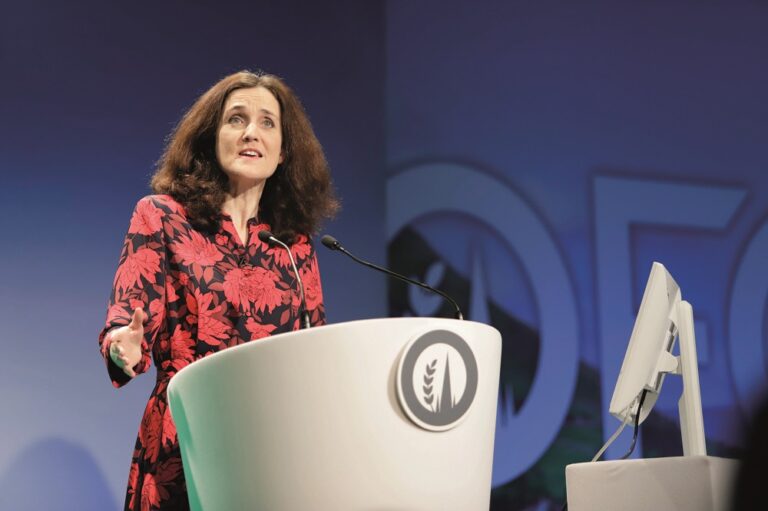The political session at the Oxford Farming Conference was dominated by discussions of trade policy, as well as transforming agriculture in order to reach net zero carbon emissions by 2040.
“This is a government that will always back British farmers.” So said Theresa Villiers addressing delegates at the Oxford Farming Conference.
The Defra secretary of state’s words were met with a degree of scepticism from the audience of farmers in the great hall of the Oxford Examination Halls on 8 January, who generally kept their hands in their laps when asked by the chair Anna Hill whether they believed British farming would be safe from a US trade deal, which would likely include agricultural products.
But Villers was insistent in her message of support. Going against tradition by opting to speak last, after the NFU’s president Minette Batters, Villers said the government heard loud and clear the message coming from food and farming.
“Backing better standards is a core part of our Brexit policy,” Villers said. “I will continue to work with you Minette as these negotiations progress, and make sure your voice is heard. We will not imperil our domestic and international reputations. Our strong British brand is built on high standards to which we hold ourselves.”
Addressing directly concerns that a US trade deal could lead to imports of food that would be illegal to produce in the UK, Villers said: “We will not dilute our strong environmental protections, food safety and animal welfare. Even limited access to our markets is a big prize to aspire to. The government will defend our national interest strongly and will be prepared to walk away if that is in our national interest.”
Taking to the stage to open the political session, Batters called on the government to commit to introducing a food standards commission that scrutinises future trade deals and safeguards British farming’s place as a global leader in climate-friendly food.
Batters reiterated the NFU would never accept British farmers being put out of business because of a trade deal that allows imports of food that would be illegal for farmers to produce in the UK.
“This all comes back to how we value our food and farming standards,” said Batters. “British farmers are world-leading in our standards of animal welfare, environmental protection and food safety. Farmers and the public want it to stay that way, which is why it is crucial that the government introduces a food standards commission that can scrutinise future trade deals and ensure we do not allow imports of food that would be illegal for our farmers to produce here.
“I know this will test the moral compass of some in government,” Batters said. “There is an opportunity for you secretary of state to lead this. We want to be the most sustainable farmers in the world and we stand ready to work with you.”
But while Villers vowed to support farmers, she declined to be drawn on the call for a new food standards commission.
Villers told the conference the agriculture bill would return to the House of Commons later this month, and the government aimed to have it passed by May. The agriculture bill aims, she said, to “secure greater fairness in the supply chain” by introducing “public money for public goods” such as creating ponds and lakes and restoring wetlands. “We want individual farmers to be able to produce a plan for what works for them,” she said.
The bill, Villers said, would contain “new provisions to require the government to conduct regular reviews of food security.”
Batters earlier told delegates the lessons of food security and domestic food production were learnt during the second world war and must never be forgotten.
Villiers responded: “We must take this very seriously and this is something I always emphasise around the cabinet table.”
Batters said the coming year would be seismic for farming, with a greater focus that ever on making agriculture more environmentally friendly. “This year will be the greatest reset for our food and farming system since the 1940s and the decisions made by this government will be felt for decades to come. We must once again recognise that there is nothing more important to our economy, our health and our environment than the very food we eat.
“One year ago, I declared that British farming could achieve net zero by 2040. The defining factor to reach that goal and help tackle climate change is a willing government. We are already leading the way in producing climate-friendly food in this country and this government has a chance to enshrine the UK as global leader in sustainability.”


